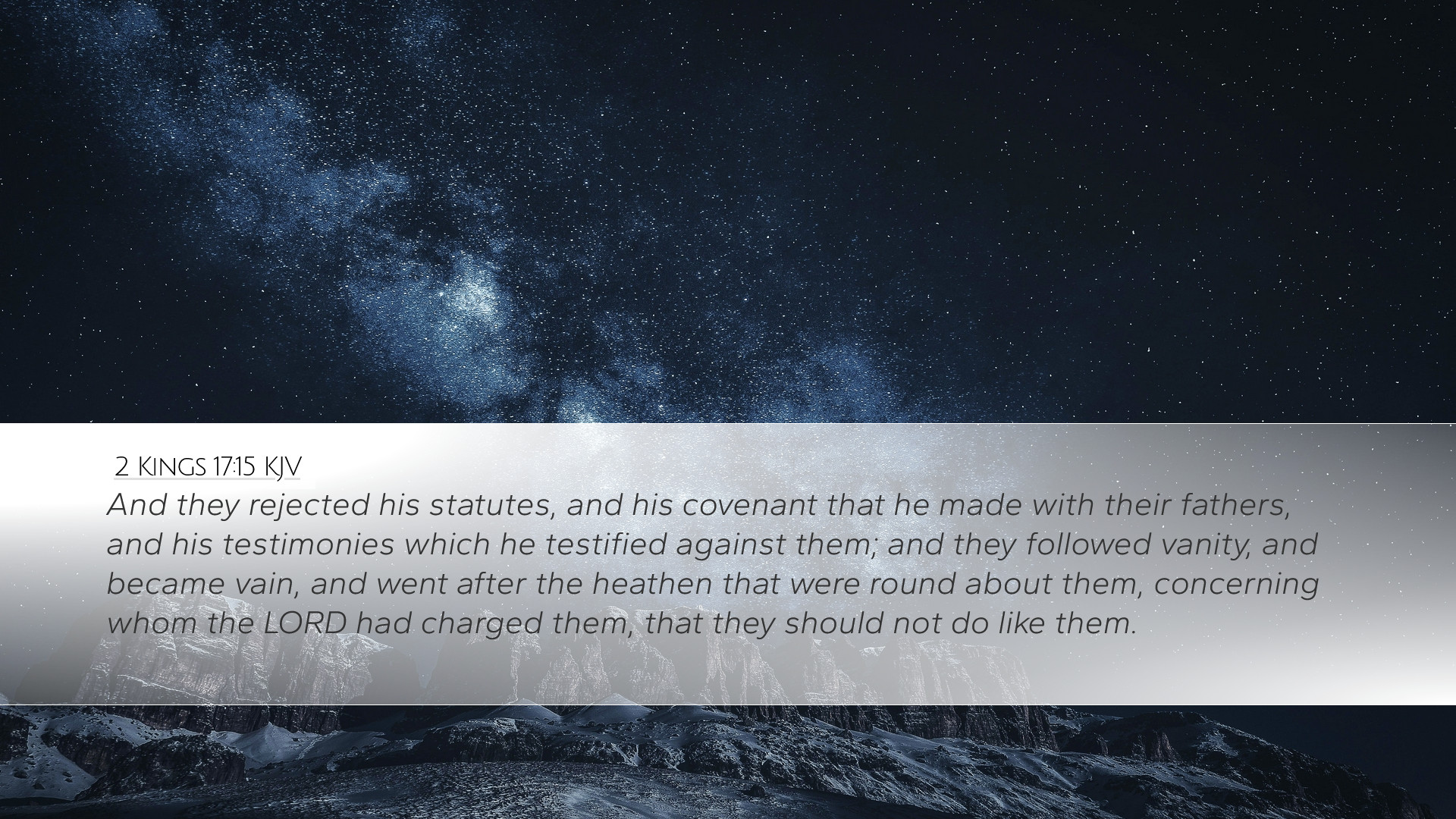Commentary on 2 Kings 17:15
Verse: 2 Kings 17:15 - "And they rejected his statutes, and his covenant that he made with their fathers, and his testimonies which he testified against them; and they followed vanity, and became vain, and went after the heathen that were round about them, concerning whom the Lord had charged them that they should not do like them."
Introduction
This verse encapsulates the pivotal themes of disobedience and apostasy that characterize the narrative of Israel during the time of the kings. It reflects a broader theological context regarding the covenant relationship between God and His people, emphasizing the grave consequences of turning away from His commandments. By examining the insights from various public domain commentaries, we can glean deeper meaning behind this warning and its implications for the faithful.
Contextual Background
This verse occurs in the historical account of the Northern Kingdom of Israel, specifically in the context of their continual rebellion against God after the rule of Solomon. It sets the stage for the impending judgment that will come upon them as a result of their idolatry and unfaithfulness. The actions described in this verse not only depict the spiritual climate of the time but serve as a solemn reminder of the covenantal obligations that were crucial for Israel's identity.
Insights from Matthew Henry
Matthew Henry, in his comprehensive commentary, emphasizes the rejection of divine statutes as a foundational act of treachery against God. He writes:
- "They kept not his statutes; they disregarded the laws which had been given to them by God, and they broke covenant with their fathers."
- "It is vain to pursue idols; such pursuits lead only to vanity itself."
Henry draws attention to the seriousness of turning away from God's commands, showing that it is not merely a lapse in judgment but an active choice to embrace folly. He highlights the futility of their actions, noting that chasing after the practices of surrounding nations (the 'heathen') was a direct violation of God's specific instructions. This reflects the inherent danger of cultural assimilation that the Israelites faced, illustrating how easily the faithful can be led astray when they compromise their distinct identity.
Insights from Albert Barnes
Albert Barnes offers a meticulous breakdown of the verse, analyzing the phrases concerning the rejection of God’s covenant:
- "They rejected his statutes" - signifying their decision to cast aside what God had commanded, implying intentional disbelief.
- "His covenant with their fathers" - underscores the generational implications of their betrayal; they not only forsake their own duty but also disregard the promises made to their ancestors.
Barnes reflects on the nature of 'vanity' mentioned in the verse and links it to the broader theological consequences: "Vanity denotes emptiness and futility; the pursuit of false gods yields no substance or satisfaction." He warns that when a nation forsakes its divine authority, it plunges into a cycle of moral and spiritual disintegration, mirroring the fate of Israel itself.
Insights from Adam Clarke
Adam Clarke provides a practical perspective on the implications of rejecting God's laws. His commentary includes the following points:
- "The testimony of God is not merely a collection of laws but a relational encounter from which we derive our identity."
- "Following vanity results in becoming vain; this reflects a transformation from image bearers of God to distorters of His likeness."
Clarke's elucidation on the cycle of vanity emphasizes a crucial warning: every action has a consequence, and forsaking divine wisdom leads to a loss of purpose and direction. The choice to follow the 'heathen' is especially poignant; it symbolizes the allure of external influences that detract from one's heritage and covenant relationship with God. Clarke challenges readers to reflect on their own lives and the influences they allow to shape their spiritual journeys.
Theological Implications
Examining the essence of this verse reveals profound theological truths that resonate throughout Scripture:
- The nature of God's covenant: The covenant is portrayed as a solemn agreement with tangible expectations. Israel's rebellion demonstrates the serious consequences of disregarding such commitments.
- The futility of idolatry: The emphasis on 'vanity' serves as a stark reminder that seeking fulfillment outside of God leads to moral bankruptcy.
- The challenge of cultural relevance vs. faithfulness: The calls to not conform to the surrounding nations carry weight for modern believers, urging them to maintain distinctiveness in a pluralistic society.
Conclusion
2 Kings 17:15 serves as a sobering reflection on the tension between faithfulness and disobedience. Drawing from significant insights by Matthew Henry, Albert Barnes, and Adam Clarke, the commentary illustrates how the choices made by Israel have enduring implications. The rejection of God's statutes and the allure of cultural idolatry are themes that continue to challenge the church today. As pastors, students, theologians, and Bible scholars, the call to adhere to the covenant relationship with God remains imperative, highlighting the need for vigilance against the distractions of modernity.


